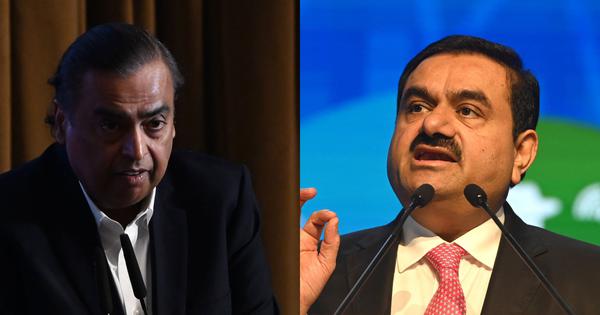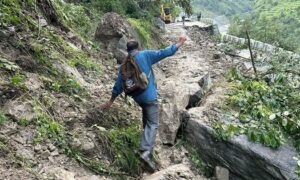
“This is how democracies die – not with a bang but with the tap of a judge’s gavel.”
That’s how one social media commentator reacted to two court orders in recent weeks that afforded extraordinary protection from scrutiny to entities associated with the two richest men in India.
On Monday, it was the Supreme Court verdict in response to two public interest litigations about Vantara, the wildlife rescue centre run by the Mukesh Ambani family’s Reliance Foundation in Gujarat.
The private facility, which houses 2,000 species from around the world, has attracted allegations that animals were being illegally acquired, that the hot climate of Jamnagar was not suitable for an enterprise of this sort and of financial irregularities. But the Supreme Court declared that there was “no foul play” in the operations.
The speed with which the court conducted the proceedings – in just three hearings – was impressive and, given the languor of India’s legal system, uncharacteristic.
On August 25, the court had constituted a Special Investigative Team to provide an “independent factual appraisal” of whether Vantara was complying with the Wildlife Protection Act, the rules governing India’s zoos, the conventions on the international wildlife trade and other relevant regulations. It was given only 18 days to submit its report.
Despite the complexity of the task, the team met the deadline. On September 15, three days after the report was handed over in a sealed cover, the court closed the matter. It said it was satisfied that there was “no contravention of law”.
But there was more. The court agreed with the contention of Vantara’s lawyer that making the report public would “allow more speculation than necessary” and decided to keep its contents confidential (except for the summary). Only Vantara was to be given a copy of the findings.
More strikingly, the court also safeguarded Vantara against future litigation: judicial and administrative forums were barred from accepting additional complaints based on the same allegations. “There are certain things we probably feel are the pride of this country,” the court said. “We should not unnecessarily rake up all these matters and raise hue and cry for the sake of that.”
However, with the report being kept secret, there’s no telling how exactly these wide-ranging allegations have been addressed by the team – and whether its findings merit further testing.
Finally, in an unconventional gesture, the court emphasised to Vantara that it is free “to pursue its remedies in accordance with law for the deletion of any offending publication or for any action against those responsible for the misinformation or for actions for defamation”.
The court’s decision to explicitly spell out remedies that have long existed in the law books has been interpreted as a clear message to journalists that investigative reports about Vantara carry significant risk.
The effects of the second court order that caused concern this week became apparent on Tuesday, when the Ministry of Information and Broadcasting on ordered the deletion of 138 YouTube links and 83 Instagram posts that were alleged to contain defamatory material about industrialist Gautam Adani’s Adani Enterprises.
The notices sent to 12 news platforms and independent journalists followed an ex-parte injunction issued by a civil court in Delhi on September 6 in a defamation suit that Adani Enterprises had brought against journalist Paranjoy Guha Thakurta and nine others.
An ex-parte injunction is an emergency order granted without the defendant being heard.
Adani Enterprises had claimed that “certain reporters, activists and organisations” had maliciously “damaged the Adani Group’s reputation and also cost its stakeholders billions of dollars and also caused massive loss to the image, brand equity and credibility of India’s brand as a country”.
Several of the organisations and individuals whose videos and posts were ordered to be deleted on Tuesday had not been named in the Adani suit. But when the civil court restrained the defendants from publishing allegedly defamatory claims about the company, it added a “John Doe” or “Ashok Kumar” clause that permitted Adani Enterprises to even act against parties not named in the case.
Astonishingly, the court also allowed the company to keep sending links of content it considered to be defamatory to government agencies and telecom intermediaries, requiring them to remove the material within 36 hours.
This allowed the company to determine for itself what material was defamatory, without needing a court to ascertain this. It was, in effect, given a free hand to blank out all criticism.
On Thursday, on an appeal by four of the journalists named in the case brought by Adani Enterprises, District Judge Ashish Aggarwal of the Rohini Courts set aside the order as it related to the appellants. The court agreed with the journalists’ contention that they should have been heard before the order was issued.
Legal experts note that the district judge on Thursday strongly criticised the latitude given to Adani Enterprises to “directly obtain removal of those articles on the basis of his own opinion that they are unfavourable” and warned against the “chilling effect” this could cause. This, they say, could ensure that the September 6 order is not used to blunt free expression. Technically, however, the John Doe/Ashok Kumar clause still stands.
Monday’s Vantara verdict and the September 6 order in the Adani case give India’s richest citizens protection against uncomfortable questions and even fair critical commentary. This is profoundly undemocratic. By safeguarding private interests, these orders undermine the public’s right to information about the actions of men whose corporations have an outsized impact on our country.
Here is a summary of last week’s top stories.
More on alleged ‘vote theft’. Congress leader Rahul Gandhi claimed that a centralised software programme was being used to systematically delete names from voter lists in Karnataka. He also alleged that Chief Election Commissioner Gyanesh Kumar was protecting those committing “vote theft”.
Gandhi has alleged that the Congress’ analysis of the Aland Assembly constituency in Karnataka showed that voter IDs were deleted with the help of fake login IDs and phone numbers from outside the state. While it was unclear how many voters were removed from the electoral rolls, 6,018 applications had been filed by entities impersonating other voters, the Opposition leader claimed.
In response, the Election Commission said that the allegations made by Gandhi were “incorrect and baseless”. The commission said that “no deletion of any vote can be done online by any member of the public, as misconceived by [Gandhi]”.
Refugees in India. The Delhi Police arrested nearly 30 African refugees in the past week and sent them to a detention centre in the city. Ankit Chauhan, the deputy commissioner of police in South Delhi, said that the refugees were “illegally overstaying their visas and passports” and were arrested under “routine exercise”.
However, human rights activists have alleged that the police seem to be “going after” African refugees, as has been the case with the detention of Rohingya refugees in recent months.
On Thursday, two Opposition MPs wrote to Prime Minister Narendra Modi, urging him to intervene in the matter and help protect the rights of the refugees. The persons who were detained are not undocumented migrants, but recognised refugees holding valid identity cards issued by the United Nations, the parliamentarians said.
As India cracks down on refugees, it is betraying its long commitment to international solidarity, writes human rights lawyer Nandita Haksar.
Work visa woes. United States President Donald Trump on Friday signed an order asking companies to pay $100,000 for each H-1B worker visa. Commerce Secretary Howard Lutnick said that it was an annual fee.
The H-1B visa is a non-immigrant visa that allows companies in the US to temporarily employ foreign workers for special occupations. About 85,000 new H-1B visas are available each year. It currently costs companies $215 to register for the H-1B visa lottery, besides several filing fees.
The Trump administration’s decision is being viewed as a setback to the technology sector in the US that relies heavily on foreign workers, especially from India.
Indians comprised 72.3% of all H-1B visas issued by the US in the financial year 2022-’23.
A genocide. Israel has committed genocide against Palestinians in Gaza, according to the United Nations. A commission of inquiry set up by the global intergovernmental organisation stated that Israel’s intent was “to destroy the Palestinians in Gaza through acts that meet the criteria set forth in the Genocide Convention”.
The acts were killing members of a group, causing them serious bodily and mental harm, deliberately inflicting conditions calculated to destroy the group, and preventing births. The commission recommended that member nations of the UN must stop the export of weapons and other equipment to Israel.
Israel’s foreign ministry rejected the report, describing it as “distorted and false”. This came on the same day that the Israeli military launched a new ground offensive in Gaza City. In August, the UN formally declared a famine in northern Gaza, warning that it could spread.
Human rights activist Sajjad Hassan writes: the chilling parallels between famine in Palestine and colonial Bengal.
Also on Scroll last week
Follow the Scroll channel on WhatsApp for a curated selection of the news that matters throughout the day, and a round-up of major developments in India and around the world every evening. What you won’t get: spam.
And, if you haven’t already, sign up for our Daily Brief newsletter.
📰 Crime Today News is proudly sponsored by DRYFRUIT & CO – A Brand by eFabby Global LLC
Design & Developed by Yes Mom Hosting






